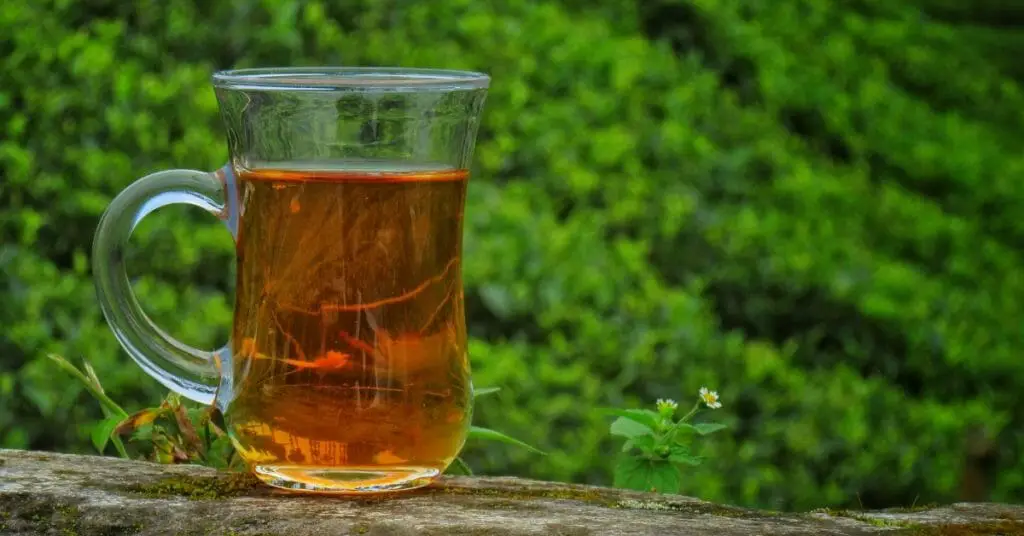Many of us consider drinking tea as an essential part of our day. Some enjoy drinking it first thing in the morning to get energized, some during a stormy evening, and some to relieve a scratchy throat (which Darjeeling tea benefits) during cold winter months.
In this post, we will be talking about a pretty special tea that is often referred to as “the champagne of teas” – Darjeeling tea.
Darjeeling tea is without a doubt one of the most popular tea varieties exported globally, and chances are you already have it in your kitchen cupboard.
However, do you know what kind of benefits Darjeeling tea offers to your health? Keep reading to find out!
What Is Darjeeling Tea
Darjeeling tea is a caffeinated beverage that originates from the Darjeeling district of West Bengal, India. It is made from the small-leaved plant Camellia Sinensis and is harvested all year round, except for winter months, during which the plants are pruned.
Pruned: The selective removal of dead, diseased, or damaged parts of a plant.
The leaves are plucked during the first flush, starting around March and April. Fifteen days after the first flush, the second flush starts. That is when you get the tea that has a ‘muscatel’ aroma and flavor, which is described as sweet and musky.
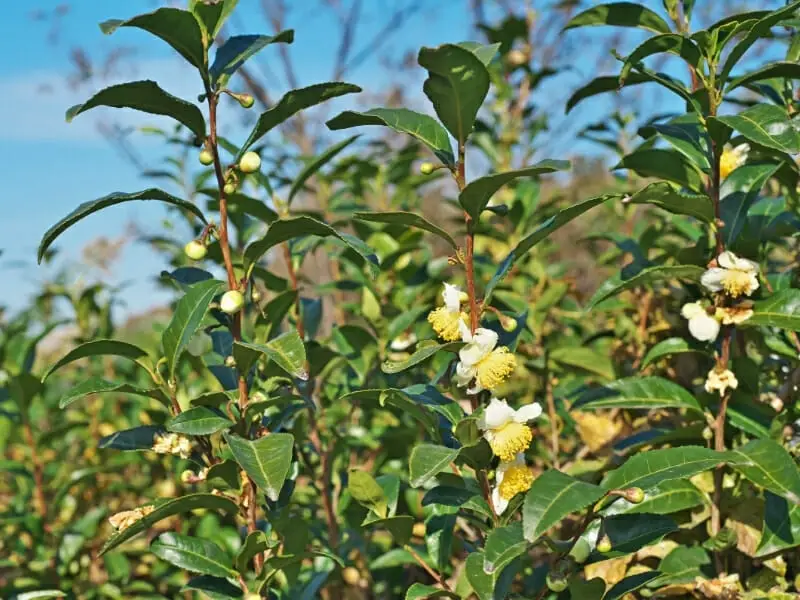
Although Darjeeling tea is often thought of as black tea, varieties such as green, white, and oolong are produced by processing and oxidizing the leaves to different levels.
For example, black tea has undergone full fermentation, oolong semi-fermentation, and green tea is not fermented at all. All those varieties are typically made by using the leaves from the second flush.
Now let’s go over the health benefits of Darjeeling tea.
Darjeeling Tea Benefits
Packed With Antioxidants
The first important health benefit of Darjeeling tea on our list is its high content of antioxidants.
The tea contains high volumes of flavonoids known as catechins. These flavonoids fight disease and neutralize free radicals that damage cells and develop into various diseases.
According to research, tea catechins are the most powerful antioxidants among plant phenols and are 20 times more active than vitamin C and 30 times more than vitamin E.
Reduces Stress
Stress has always been part of our daily lives and has the ability to impact our mental and physical health. It is nearly impossible to avoid stress completely, but a cup of tea can provide much-needed relief.
Several studies show that polyphenols found in tea help regulate the production of the stress hormone cortisol.
Weight Loss
Flavonoids found in Darjeeling tea are reported to have the potential to prevent fat oxidation and decrease the absorption of nutrients in the gastrointestinal tract.
What’s more, they prevent cholesterol (LDL) accumulation and obesity by managing energy consumption.
Due to its caffeine content, it also increases energy levels, which usually leads to more physical activity. This makes it easier to burn calories and fat. Tea, in its natural form, is also low in calories and sugar, which makes it a great replacement for sugary drinks.
Heart Health
Keeping your heart healthy is essential for the processes in your body to function as they should. As we like to say: “with a healthy heart, the beat goes on”.
Darjeeling tea is packed with large amounts of flavonoids, such as theaflavins and thearubigins, which are predominantly found in green and black teas. Studies show that these compounds reduce “bad” cholesterol and increase insulin levels significantly.
Now that we have discussed some of the health benefits of Darjeeling tea, let’s go into more detail on what to keep in mind when preparing the tea at home!
Darjeeling Tea Caffeine
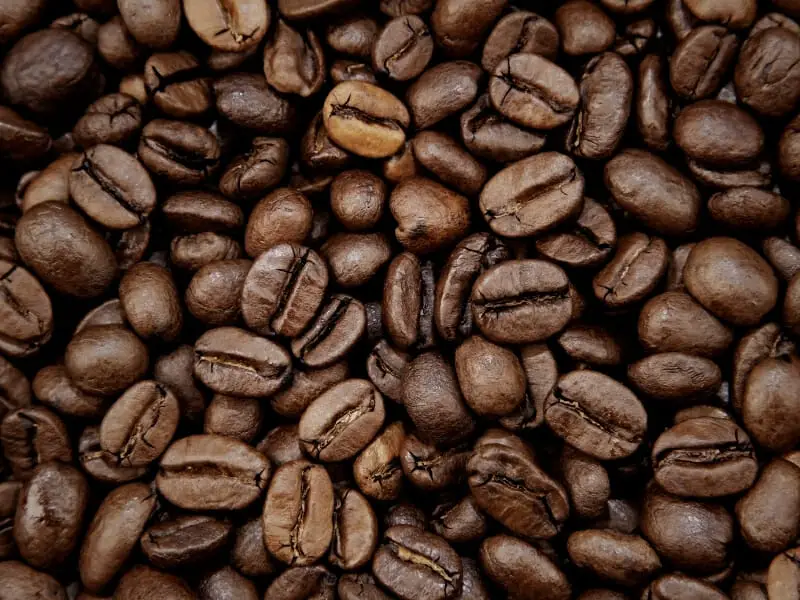
Something that a lot of people want to know when it comes to Darjeeling tea is whether it contains caffeine, and if so, how much.
Research shows that Darjeeling tea does contain caffeine and the caffeine level in one cup ranges between 40 and 70 milligrams (coffee has 70-100 mg in a cup). However, multiple factors come into play that can affect it.
The first important thing to note is that the amount of caffeine varies depending on its flush but also depends on the number of leaves used and its steeping time.
To give you an idea, fifteen minutes of steeping will release around 90 percent of the caffeine. That means the less time you brew the tea for, the smaller the caffeine content.
How To Brew Darjeeling Tea
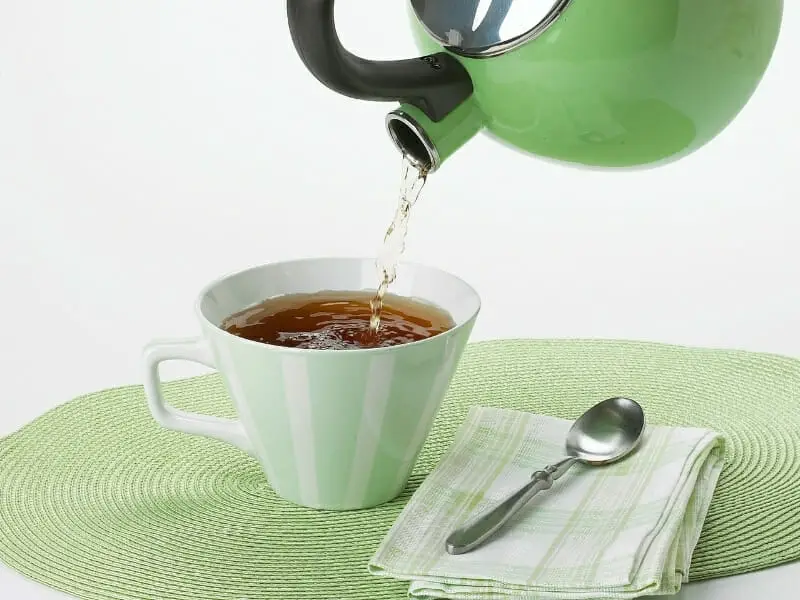
Some might argue that there is no only way to drink tea. Nevertheless, there are some ideal guidelines provided by local Darjeeling guides.
The way of preparing the tea can vary, depending on whether you are using black, green, white, or oolong tea. There are, however, some common steps that they all share.
- Boil water in a kettle. Use filtered or bottled water for best results. This is important because tap water often contains impurities such as chlorine, salt, and iron. These can significantly change the authentic taste of the tea.
- Water temperature should be anywhere between 175 and 200F, depending on the type of tea. Generally speaking, for the first flush Darjeeling, it is suggested to heat the water to 175-180F and the second flush 190-200F.
- Put 1 teaspoon of loose leaf tea per cup. Add as many as needed for the teapot accordingly. Pour the hot water into the teapot and let it steep for 3 minutes. If the teapot doesn’t already have a strainer, place one in the cup and pour the tea over it.
- Your tea is ready!
Darjeeling Tea With Milk
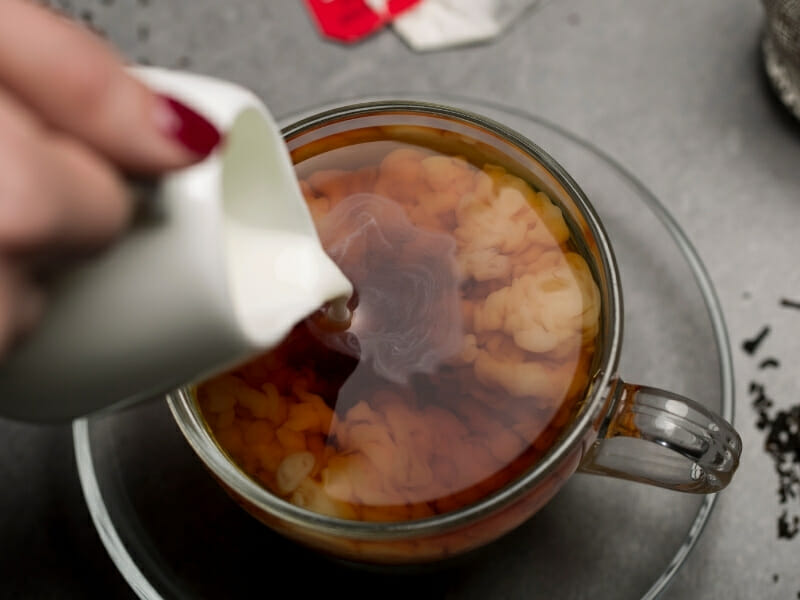
Now, before you hurry up and add milk to your cup of Darjeeling tea, there are some things you should know. As we’ve mentioned, Darjeeling’s taste and color depend on which flush (harvest season) you got.
Here are some milk guidelines for each flush:
- First flush Darjeeling tea: it is mild and floral and doesn’t go well with milk. Tea connoisseurs even advise against adding sugar.
- Second flush Darjeeling tea: it has a bolder flavor and can even be astringent depending on the steeping time. It’s still better without milk, but will mix better, especially if you prefer a milder taste.
- Autumn flush Darjeeling tea: it is much bolder than the other flushes and is said to mix well with milk.
Conclusion
Darjeeling tea is widely popular for many reasons – rich flavor, intense aroma, and countless health benefits. It is an important part of the daily routine of many, and as we can see, rightfully so.
Let us know in the comments below if you have any tips of your own for preparing a cup of this special tea at home!
If you’re looking for another special tea, check out our article about passion fruit tea.
